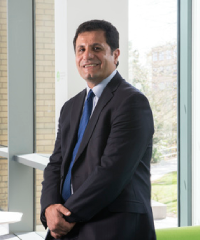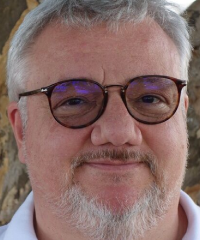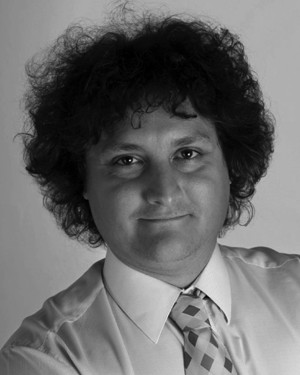6GNet 2023 Keynotes
Keynote #1
Title: 6G Challenges and some solutions
Abstract: The talk will be why, what and how of 6G and present some potential solutions that address these challenges.
These challenges relate to future wireless, ubiquitous coverage and Core network that underpin concept of Future Network of Networks.

Rahim Tafazolli
(University of Surrey, UK)
Bio: Regius Rahim Tafazolli, Fellow of Royal Academy of Engineering, IET, WWRF and Regius Professor of Electronic Engineering, Professor of Mobile and Satellite Communications, Founder and Director of 5GIC, 6GIC and ICS (Institute for Communication System) at the University of Surrey. He has over 30 years of experience in digital communications research and teaching. He has authored and co-authored more than 1000 research publications and is regularly invited to deliver keynote talks and distinguished lectures to international conferences and workshops. He was an advisor to the Mayor of London (Boris Johnson) on London 2050 Infrastructure.
Keynote #2
Title: 6G SYSTEM ARCHITECTURE: A SERVICE OF SERVICES VISION
Abstract: The architectures of mobile networks have seen an unprecedented techno-economic transformation, fusing the telecommunications world within the cloud world, adding the spices of Software Engineering to the overall system design, and ultimately yielding the concept of Telco Cloud. This has brought significant benefits in terms of reducing expenditure and operational costs, flexibility in deployment, and faster time to market. The key enablers are network function virtualization, software-defined networking, and edge/cloud computing. Artificial intelligence is also kicking in this arena. When all these technologies are well integrated, the creation and life-cycle management of fully programmable, flexible, service-tailored, and automated end-to-end network slices/services become possible. This will support diverse 5G and beyond 5G services, spanning from tactile IoT to pervasive robotics and immersive services.
In this talk 6G Flagship introduces an unprecedented and disruptive vision for 6G that shifts the perception of future mobile networks from the old-fashioned concept of “network of networks” towards a new vision of “service of services.” The talk then introduces the functional model of the envisioned system architecture, along with its components. It then provides a high-level description of the logical architecture.

Ari Pouttu
(University of Oulu, Finland)
Bio: Prof. Ari Pouttu has scientific and engineering experience as a researcher, project manager and research manager in various domains of ICT development. The projects under his command have resulted in waveforms and system designs for military radio communication, radar systems, embedded device networks, future wireless radio communications including cellular systems, cognitive networks and navigation applications.
He has published more than 70 conference or journal papers in the field of wireless communications and he holds two patents. He is the principal investigator of 5G test network (5GTN) experimental research, and vice-director of the national 6G Flagship Programme as well as 6GESS programme targeting 6G solutions including wireless solutions for business verticals such as energy, industry, health and automotive.
Keynote #3
Title: On-Device Learning for Extreme-Edge Intelligence
Abstract: AI in telecommunications is currently at its all-time high as a solution to optimize and automate networks, keep them healthy and secure, while reducing operational costs. AI not only provides an ability for devices and systems to perceive, deduct, and act intuitively and intelligently, but also changes how we approach and solve technical challenges.
Future 6G networks with their massive connectivity will elevate object capabilities to new levels as well as expand intelligence into new devices. With the proliferation of connected devices and the role of on-device intelligence becoming ever more important, the transformation of AI into fully distributed intelligence will be one of the keys to realize the full potential of future 6G networks.
In this talk, we will present the on-device learning approach through algorithm-system co-design which adapts pre-trained AI model to newly collected data afterdeployment. By training and adapting locally at the edge, the AI model can learn to improve its predictions and achieve continuous learning and user personalization.

Van-Tam Nguyen
(Télécom Paris, France)
Bio: Van-Tam Nguyen received the Diplôme d’Ingenieur from Ecole Superieure d’Electricite (Supelec), the M.Sc. degree in automatic and signal processing from University Paris XI, the graduation degree in image processing from EPFL, Switzerland, in 2000, the Ph.D. degree in communications and electronic from Ecole Nationnale Superieure des Telecommunications (Telecom ParisTech) in 2004, and the H.D.R. degree from University Paris VI in 2016. He was a Rank A Guest Researcher at NICT, Japan (2012-2013). He has held visiting positions at UC Berkeley (2013-2016) and Stanford (2016-2017). He was director of Intek Institute (2018) and CEO of TAM-AI Co. Ltd (2019-2021). He received a Senior Marie Curie Fellowship from the European Commission in 2015. In 2022, he become the head of the communications and electronic department at Télécom Paris, where his research interests includes, ADCs, Cognitive Radio, Neural Networks, Tiny ML, embedded AI and AIoT.
Keynote #4
Title: A 6G Differentiated Services Vision and related Challenges
Abstract: TBA

Emmanuel Dotaro
(VP, Fellow 5G-6G expertise (Thales, France))
Bio: Emmanuel Dotaro is VP, Fellow 5G-6G expert at Thales. He is in charge of 6G topics across the Thales group with CTO organization. He received an M.S. degree in Computer Science from the University of Versailles, France in 1996. He was three years with the Institut National des Telecommunications Performance Evaluation lab. as PhD student while holding a teaching position at the University of Versailles. He joined in 1999 the Alcatel Research and Innovation lab. at Marcoussis, France. He was director of research on networking topics at Bell Labs including successively Packet Transport Infrastructure and Semantic and Autonomic Technologies. He joined Thales in 2009 as director of innovation for C4I systems and was until 2022 the director of ICT and Security labs at Thales Secure Communications and Information Systems. He holds more than 30 papers as author or co-author as well as more than 40 patents in the ICT field. He is at the initiative, contributor or leader of various European or national collaborative R&D projects. He is serving at various international conference or journal Technical Committees. Beside his current research and innovation management activities he is involved in various National or European ICT and Cybersecurity initiatives: – He serves at the 6G-IA association Governing Board as well as specific Task Forces or Working Groups (Verticals, Policies, Security,…). Although, he is devoted to foster collaborations between Network and Security communities/ecosystems. – He is member of the NetworldEurope Steering Board and expert group. Belonging to the editors of the European Strategic Research and Innovation Agenda and in particular Security chapter. – he is Participating to Scientific committee, certification and research activities of ECSO association (cybersecurity community) – He is the chair of the Cyber & Security Hub (260+ members) from Systematic Paris-Region cluster – He is active in multiple industrial and research digital-related ecosystems such as Cyber Campus, Strategic digital infrastructure committee and Strategic Security Industry in France.
Keynote #5
Title: The New NTN (Non-Terrestrial Networks) Discussion
Abstract: NTN (non-terrestrial networks) will arguably be the most prominent aspect of 6G. Most of the novel elements in the ITU 6G wheel diagram (ITU-R WP5D Recommendation Framework for IMT-2030), such as coverage, interoperability, sustainability, and resilience, can simply be read as “NTN”.
The NTN expression has been used to refer to the SatCom paradigm almost exclusively until recently. It is now increasingly acknowledged that within NTN, there are separate satellite, HAPS (high altitude platform station), and UAS (unscrewed aerial systems) paradigms with their own special dynamics.
NTN is not only for connectivity; the framework includes connectivity, computing, edge intelligence, surveillance, security, sensing, monitoring, positioning, localization, navigation, and more. The humanity will demonstrate its full potential in every dimension (economic prosperity, wellbeing, equal opportunity, environmental, and more), when the communities get ultra-connected with a sustainable, reliable, resilient, intelligent, green/clean/eco-friendly, secure, ubiquitous & affordable, and ultra high-speed “network of networks” with terrestrial (6G and beyond) and non-terrestrial (space and stratospheric) components.
The NTN discussion will continue throughout the 2030s as well (the beyond-6G era) – exciting times indeed…

Halim Yanikomeroglu
(Chancellor’s Professor at Carleton University, Canada)
Bio: Dr. Halim Yanikomeroglu has been with the Department Systems and Computer Engineering at Carleton University (Ottawa, Canada) since 1998, where he is currently a Chancellor’s Professor. He received the BSc degree from the Middle East Technical University (Turkiye) and the MASc & PhD degrees from the University of Toronto. His research interests cover many aspects of wireless communications and networks, with a special emphasis on non-terrestrial networks (NTN) in the recent years. He has given 110+ invited seminars, keynotes, panel talks, and tutorials in the last five years. He has supervised or hosted over 160 postgraduate researchers in his lab at Carleton. Dr. Yanikomeroglu has coauthored 600+ peer-reviewed research papers including around 300 papers in 30 different IEEE journals. His extensive collaborative research with industry resulted in 40 granted patents. Dr. Yanikomeroglu is a Fellow of the IEEE, the Engineering Institute of Canada (EIC), the Canadian Academy of Engineering (CAE), and the Asia-Pacific Artificial Intelligence Association (AAIA). He is a Distinguished Speaker for the IEEE Communications Society and the IEEE Vehicular Technology Society, and an Expert Panelist of the Council of Canadian Academies (CCA).
Dr. Yanikomeroglu is currently serving as the Chair of the Steering Committee of IEEE’s flagship wireless event, Wireless Communications and Networking Conference (WCNC). He is also a member of the IEEE ComSoc Governance Council, IEEE ComSoc Globecom/ICC Management & Strategy (GIMS) Standing Committee, IEEE ComSoc Conference Council, and IEEE PIMRC Steering Committee. He served as the General Chair and Technical Program Chair of several IEEE conferences. He has also served in the editorial boards of various IEEE periodicals. Dr. Yanikomeroglu received several awards for his research, teaching, and service, including the IEEE ComSoc Satellite Communications Technical Recognition Award (2023), IEEE ComSoc Fred W. Ellersick Prize (2021), IEEE VTS Stuart Meyer Memorial Award (2020), and IEEE ComSoc Wireless Communications TC Recognition Award (2018). He received best paper awards at IEEE Competition on Non-Terrestrial Networks for B5G and 6G in 2022 (grand prize), IEEE ICC 2021, IEEE WISEE 2021 and 2022.
Keynote #6
Title: A Test & Measurement Perspective on Integrating Artificial Intelligence into 6G Future Networks
Abstract: The cellular technology has taken a great leap forward over the past decade. Even if 5G has brought tremendous change, 6G mobile networks will represent the underlying fabric of the future network deployments. Societies are increasingly reliant on communications in a broader sense, making them one of the critical infrastructures. 5G evolution and 6G are expected to push the boundaries of mobile networks‘ trustworthiness, reliability, and robustness to a level where the networks must fulfill the needs of most mission- and business-critical use cases.
In increasingly complex future mobile networks artificial intelligence (AI) will play one of the key roles and an optimal test infrastructure is critical for its advancement in mobile communications.
Therefore, trial networks, which refer to fully configurable, manageable, and controlled end-to-end networks, composed of both digital and physical nodes will be instrumental in the evaluation of AI embedded in the infrastructure of the future mobile networks. An exhaustive and modular facility for the European experimentation ecosystem is required to support the next decade technology and research validation processes needed on the pathway towards 6G. A rich and extensible toolbox complemented by automated experimentation capabilities will enable the evaluation of 6G KPIs and KVIs.

Michael Dieudonné
(Keysight Technologies, Belgium)
Bio: Michael Dieudonné is currently the Director of Keysight Technologies Belgium. He is also an R&D Department Manager of Keysight Laboratories and supervises research performed in different domains around 5G/6G wireless and network test, and high-frequency metrology. He currently works on test automation (OPentap.io), Open Radio Access Network (ORAN) test, the Internet of Things (IoT) test, 5G test, and 6G test. He coordinates the 6G-SANDBOX SNS-JU project and is member of the 6G-IA Board. Over the years he as been active in various international projects, such as the EURAMET EMPIR MET5G Project (on 5G EMF), coordinated European Union (EU) SAMURAI Project defining early day multiple input multiple output (MIMO) techniques for 4G systems, and European Union-Horizon 2020 (EU-H2020) Triangle (test of application in a 5G context).












